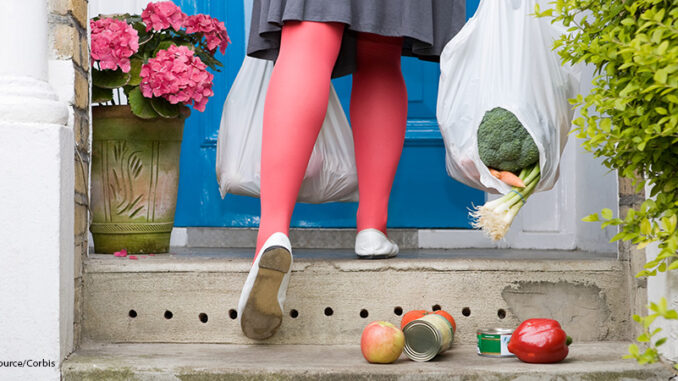
In June, btw brought you the story of how many businesses, and even cities, are banning plastic drinking straws in an effort to eliminate some of the plastic waste in our oceans and waterways. Now, one U.S. grocery store chain is taking another important anti-plastic measure, and banning single-use plastic bags as well. The Kroger Co. has announced that it will stop using plastic bags completely by 2025. Here, btw takes a closer look.
Why Plastic Bags?

Credit: McGraw-Hill Education
Reusable plastic bags are harmful to the environment for the same reason that plastic straws are. Unlike paper products, they never break down entirely. Instead, they break into smaller and smaller pieces, called microplastics, which are impossible to remove from our waterways. Scientists have found microplastics in shellfish, drinking water, and even beer. And even when they don’t make their way into our rivers and streams, plastic bags–because they aren’t biodegradable–put a strain on landfills and waste management facilities. They can also endanger wildlife, and create unsightly litter.
But Will This Make a Difference?
Sure, you might say that Kroger is just one grocery store. But they are also the largest grocery store chain in the country. In addition to Kroger, the Kroger Co. includes Food 4 Less, Pick ‘n Save, Harris Teeter, Ralphs, QFC, and more, spanning 35 states and Washington, D.C. In fact, as of last year, the company owned over 2,700 stores nationwide. So when a retail chain of this size agrees to stop using plastic bags, it will hopefully have a decided impact on the amount of plastic that finds its way into the oceans or into landfill.
Following in Their Footsteps
It’s important to note that Kroger is not the first entity to phase out reusable plastic bags. California already put a statewide ban on these bags in 2016. Hawaii hasn’t passed a statewide ban yet, but all of its most populated counties have. In Washington, D.C., you can still get a plastic bag, but you’ll have to pay $0.05 for it. Many other cities and counties across the country have complete bans in place, including Austin, Texas; Boston, Massachusetts; Chicago, Illinois; Los Angeles, California; San Francisco, California; and Seattle, Washington.
Around the world, Australia has banned plastic bags in many of its states and largest retail chains. And in Kenya, using plastic bags could earn you heavy fines or even jail time.
The Other Side of the Plastic Bag Debate
Not everyone is happy about this decision. Without plastic bags available, customers will have to purchase a more-expensive alternative. And there’s some debate over whether or not these alternatives are even better for the environment in the first place. A recent Danish study concluded that, because plastic bags are light-weight and use fewer materials to produce, a customer would have to use an organic cotton bag 2,000 times before it canceled out the environmental impact of one disposable plastic bag. This is because the cotton bag is less efficient and requires more materials and energy to produce.
